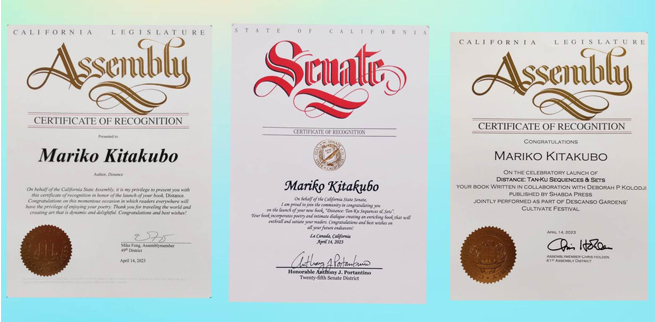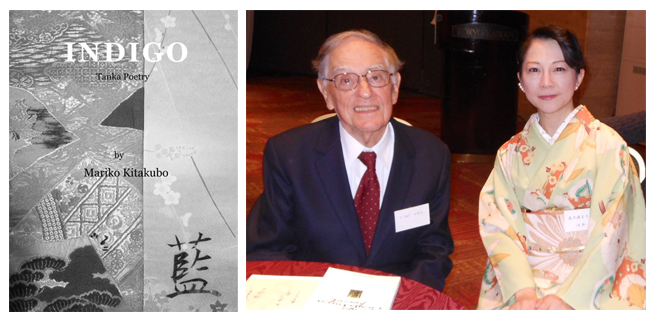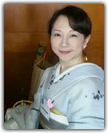Tanka Poet Mariko Kitakubo.
Whiteness of the lilies, they don't need to express their love they just stand as they are.
What's New. Information for new publications, recitals, etc.RSS
- Jan 20, 2026
- Tan-Ku Association Online Magazine KIZUNA Nunber 3, January 2026
- Nov 27, 2025
- November 2025 Reading performance in London
- Nov 17, 2025
- About submission to KIZUNA
- Nov 06, 2025
- Notice of submission due date for KIZUNA 3rd issue
- Nov 03, 2025
- TSA Ribbons Fall/Winter 2025:Vol 21 No.2
Received certificates of recognition
I am honored to receive Certificates of Recognition from the California State Senate and Assembly.
It is a great honor for me to be recognized for my small international activities and to have our co-authored book, DISTANCE, read by them. I humbly receive these recognitions and would like to keep moving forward in my activities.
Thank you very much from the bottom of my heart.
Click here to read more about DISTANCE Tan-Ku Sequences &Sets.

(Left)
CALIFORNIA LEGISLATURE Assenbly
CERTIFICATE OF RECOGNITION
Presented to: Mariko Kitakubo Author, Distance
On behalf of the California State Assembly, it is my privilege to present you with this cenificate of recognition in honor of the launch of your book, Distance. Congratulations on this momentous occasion in which readers everywhere will hm·e the privilege of enjoying your poetry. Thank you for traveling the world and creating art that is dynamic and delightful. Congratulations and best wishes!
Mike Fong, Assemblymember 49th District April 14, 2023
(Middle)
STATE OF CALIFORNIA Senate
CERTIFICATE OF RECOGNITION
Mariko Kitakubo
On behalf of the California State Senate, I am proud to join the community in congratulating you on the laundh of your new book "DISTANCE: Tan-Ku Sequences & Sets."
Your book incorporates poetry and intimate dialogue creating an enriching book that will enthrall and satiate your readers.
Congratulations and best wishes on all your future endeavors!
La Canada, California April 14, 2023
Honorable Anthony J. Portantino Twenty-fifth Senate District
(Right)
CALIFORNIA LEGISLATURE Assenbly
CERTIFICATE OF RECOGNITION
CONGRATULATIONS MARIKO KITAKUBO
ON THE CELEBRATORY LAUNCH OF DISTANCE: TAN-KU SEQUENCES & SETS YOUR BOOK WRITTEN IN COLLABORATION WITH DEBORAH P KOLODJI PUBLISHED BY SHABDA PRESS JOINTLY PERFORMED AS PART OF DESCANSO GARDENS' CULTIVATE FESTIVAL
APRIL 14, 2023 ASSENBLY MEMBER CHRIS HOLDEN 41ST ASSENBLY DISTRICT
Bilingual anthology INDIGO is published from SHABDA PRESS

Dear SHABDA PRESS,
Thank you for publishing my new tanka collection book "INDIGO".
Mariko Kitakubo has published five books of tanka including two bilingual ones, "On This Same Star" and "Cicada Forest." She has also produced a CD of her tanka titled "Messages."
Mariko is an experienced performer who has presented her poetry on at least 130 occasions, 80 of them overseas (Nov. 2015). She hopes to encourage more poetry lovers worldwide to appreciate and practice tanka.
Please click here to purchase the book on Amazon or Barnes & Noble.
“The Japanese, for over a thousand years, have composed the tanka and considered it their most important form of poetry. In the nineteenth century, the spread of European poetry induced many Japanese poets to doubt that a poem in only thirty-one syllables could be anything more than the record of a momentary sensation. Ishikawa Takuboku, though famous as a rebel poet, answered the doubters, “Although a tanka may last only a second, it is a second that will not return again, no matter how long one lives. I believe that such moments are to be cherished, I do not wish to let them escape.” He added somewhat cynically, “One of the few blessings that we Japanese enjoy is having the tanka.”
Takuboku retained the traditional thirty-one syllables of the tanka but divided them into three lines, instead of the traditional single line, giving the form greater dramatic possibilities.
The poems of Mariko Kitakubo, both in Japanese and in English, contain a combination of the thousand year old and the most modern. Her Japanese poems have the traditional number of syllables and the English poems are divided into five lines as in tanka :
ga no kage no/ fui ni ookiku/ nari yukeri/
aragai gataki/ houyou no nochi
suddenly
the shadow of a moth
growing larger--
after an embrace
difficult to resist
The Japanese poems are in ancient, not modern speech. But the division of the poems into two sections in the Japanese and five in English makes the poems seem strikingly modern. Mention of a moth, an insect appealing to English poets but shunned by Japanese poets, may seem to separate the two worlds, but the embrace brings them together.”
--Donald Keene
“Mariko KItakubo's sixth book of tanka is a masterpiece of disquiet and profound yearning. It's poetry speaks to the human condition in an era that has just begun to understand, and attempt to divert and remedy, a ruination that evidence shows mankind itself has inflicted on the planet. Indigo leaves us gazing with longing upon our own disappearance into the existential drifts of time and materiality.
Kitakubo writes, "my motherland / will be a coffin / of the stormy wind" and points to "the light rain / of radiation" to show us how "history is settling / in the bottom of the river." She sees herself as "an infinitesimal / splash in the dust" and outlines in images of stark finality a vision of sunflower seeds and a people-less planet "after the dream / of civilization." Here is poetry that steps with courage and passion into the forum of ideas and the enormous issues of our day. Kitakubo's mastery of the ancient tanka form gives to her testament in Indigo the perspectives of personalized history and the high art of a compelling literary tradition.
My congratulations go to Shabda Press for publishing this first edition of a work so worthy of universal value and wide readership. May the voice within us all find equal resource, principle, and kinship.”
--Michael McClintock, President, Tanka Society of America (2005-2011) and author of "The Tanka Café" in Ribbons: Tanka Society of America Journal.
"From floating lanterns at Hiroshima to the unstoppable petal storm of cherry blossoms, Mariko Kitakubo’s vivid imagery tugs at the full range of our emotions—from the horror of war to the joy of a new love, from redwood forests to dreams of Betelgeuse, Indigo is a highly recommended journey you will never forget."
--Deborah P. Kolodji, California Regional Coordinator, Haiku Society of America
My thoughts on reading performance
Reading performance in Paris in September, 2013, was my 100th Tanka reading in total, and the 50th of presentation overseas and international events. I would like to extend my sincere gratitude towards all the audience and everyone who supported me to enable this wonderful achievement. Without their support it was not possible. I would like to continue making efforts, aiming at 100 presentations overseas.
In commemoration of my reading activities so far, I put together a photobook. I would be more than happy if you could take time to view it on the web.
